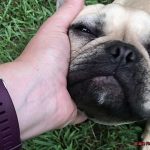Can French Bulldogs be house dogs?
Welcome to our blog, where we’re about to spill the beans on why French Bulldogs make the most pawesome house companions. We all know those adorable bat-like ears and wrinkled faces can melt even the coldest hearts. But here’s the big question: can these cuties really thrive in a cozy home?
Today, we’re embarking on a delightful journey that combines personal tales with expert insights to uncover why French Bulldogs are total rockstars when it comes to snuggling up in your humble abode. Get ready to unleash their paw-some potential.

French Bulldogs’ Exercise Requirements: Do They Need a Lot of Exercise?
Contents
- 1 French Bulldogs’ Exercise Requirements: Do They Need a Lot of Exercise?
- 2 French Bulldogs and Extreme Temperatures: What Should You Consider?
- 3 French Bulldogs’ Behavior in the Home: Are They Low Maintenance?
- 4 Separation Anxiety in French Bulldogs: How Can You Minimize It?
- 5 Grooming Needs for French Bulldogs: What Should You Know?
- 6 Benefits of Having a French Bulldog as a House Dog
- 7 Potential Challenges of Keeping a French Bulldog as a House Dog
- 8 Conclusion

The answer is, not exactly.
French Bulldogs are generally considered to be a low-energy breed and do not require as much exercise compared to some other breeds. They have a moderate activity level and are known to be indoor dogs. However, it is important to note that every dog is different, and exercise needs can vary based on age, health, and individual preferences.
Due to their brachycephalic (short-nosed) structure, French Bulldogs have a tendency to overheat easily. This means that strenuous activities in hot weather should be avoided. Instead, daily exercise for a French Bulldog can include short walks around the neighborhood, interactive play sessions at home, or supervised off-leash play in a secure area.
Mental stimulation is also important for French Bulldogs, as they are an intelligent breed. Puzzle toys, obedience training, and interactive games can help keep them mentally engaged.
Ideally, it is recommended to provide at least 20-30 minutes of exercise each day for a French Bulldog, divided into multiple sessions. However, this can vary depending on the individual dog’s needs. It is important to pay attention to your dog’s cues and adjust their exercise routine accordingly.
One thing to keep in mind is that French Bulldogs are prone to obesity. Monitoring their calorie intake and ensuring they get enough exercise is crucial for maintaining a healthy weight. Consulting with a veterinarian or a professional dog trainer can help determine the appropriate exercise routine for your French Bulldog based on their specific needs and limitations.
French Bulldogs and Extreme Temperatures: What Should You Consider?
In this blog post, we will explore the potential risks that French Bulldogs face in both hot and cold weather and discuss the precautions you should take to ensure their safety. So, grab a cup of coffee and let’s dive in.
Hot Weather Risks and Precautions:
French Bulldogs have a unique physical structure with a short snout and compact body, which makes it challenging for them to regulate their body temperature efficiently. In hot weather, they are at a higher risk of heatstroke and overheating. Here are some precautions to keep in mind:
- Provide shade: Make sure your French Bulldog has access to shade throughout the day. This can be achieved by setting up umbrellas or creating shaded areas in your backyard.
- Freshwater availability: Keep plenty of fresh water available for your furry friend at all times. Hydration is key to keeping them cool.
- Limit outdoor activities: Avoid taking your French Bulldog for walks or vigorous playtime during the hottest parts of the day. Opt for early morning or late evening walks when the temperature is cooler.
Cold Weather Risks and Precautions:
French Bulldogs have short coats that offer minimal protection against cold temperatures, making them susceptible to hypothermia and frostbite. Here’s how you can protect them during winter:
- Winter wear: Invest in cozy sweaters or jackets for your French Bulldog to keep them warm during walks or outdoor activities. They’ll look adorable too.
- Indoor warmth: Ensure that your home is properly heated, especially during colder months. Provide a warm and comfortable sleeping area for your furry friend.
- Limited exposure: Minimize your French Bulldog’s time outdoors during extremely cold weather conditions. Short bathroom breaks and supervised playtime are recommended.
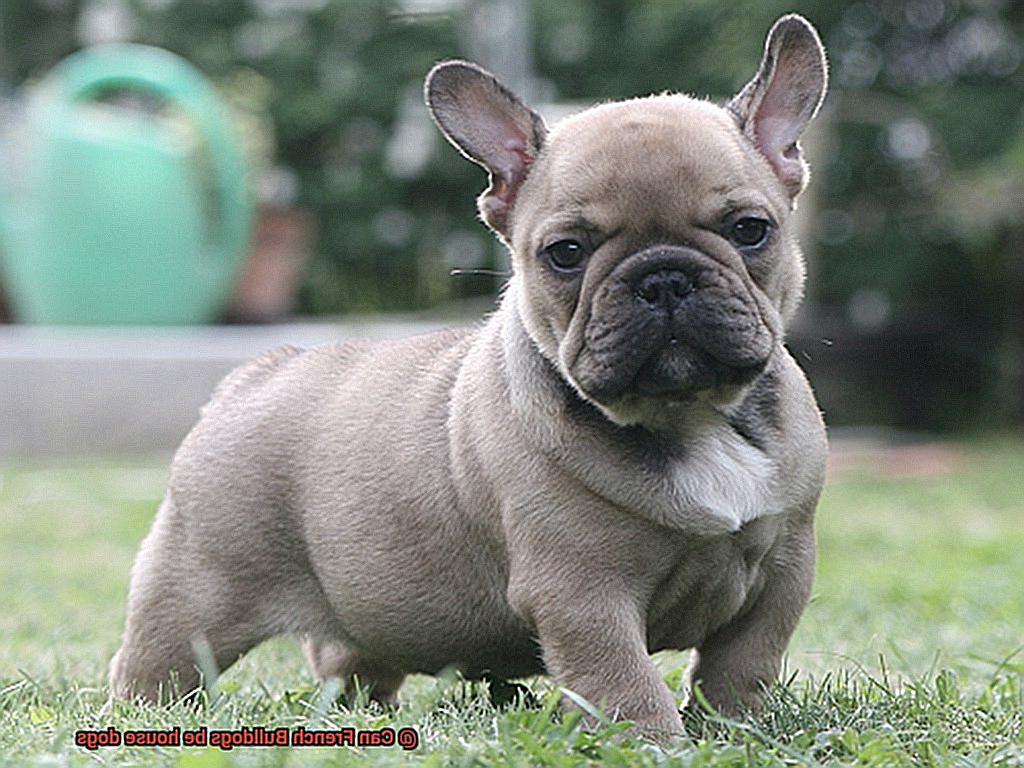
Consider Your Region:

It’s important to consider the climate of your region when keeping a French Bulldog. If you live in a hot and humid area, additional precautions such as air conditioning or cooling mats may be necessary. Likewise, in colder regions, proper home insulation and heating become crucial for their well-being.
Consult with a Veterinarian:
French Bulldogs are prone to respiratory issues, which can worsen their tolerance to extreme temperatures. It is essential to consult with your veterinarian to understand any existing health conditions and receive personalized advice for your French Bulldog’s specific needs.
French Bulldogs’ Behavior in the Home: Are They Low Maintenance?
French Bulldogs are beloved for their adorable looks and playful personalities. Many people assume that these small, compact dogs are low maintenance pets, but is that really the case? Let’s take a closer look at their behavior in the home to find out.
- Energy Levels: French Bulldogs are generally low energy dogs. They don’t require excessive exercise and a short daily walk or play session is usually sufficient. This makes them suitable for apartment living or homes with limited outdoor space.
- Barking: French Bulldogs are known to be relatively quiet dogs. They are not prone to excessive barking or howling, which can be a relief for those living in close quarters with neighbors. However, they may still bark if they sense potential danger or unfamiliarity.
- Need for Companionship: French Bulldogs thrive on attention and enjoy being around their owners. They form strong bonds with their family members and may become anxious or develop separation anxiety if left alone for long periods of time. Sufficient social interaction and mental stimulation are important to prevent boredom and loneliness.
- Compatibility with Children and Pets: French Bulldogs are generally good with children and other pets, making them suitable for families. However, supervision is necessary during interactions between young children and dogs to ensure safety. They may also be possessive of their toys or food, so early training and socialization are crucial.
- Grooming Needs: French Bulldogs have a short coat that requires minimal maintenance. They shed moderately, so regular brushing can help reduce loose hair around the house. Cleaning their facial wrinkles is important to prevent skin infections or irritations.

Separation Anxiety in French Bulldogs: How Can You Minimize It?
This can sometimes lead to separation anxiety when they are left alone for extended periods. In this section, we will explore effective strategies to minimize separation anxiety in French Bulldogs, ensuring their well-being and maintaining a harmonious household.
Gradual Desensitization:
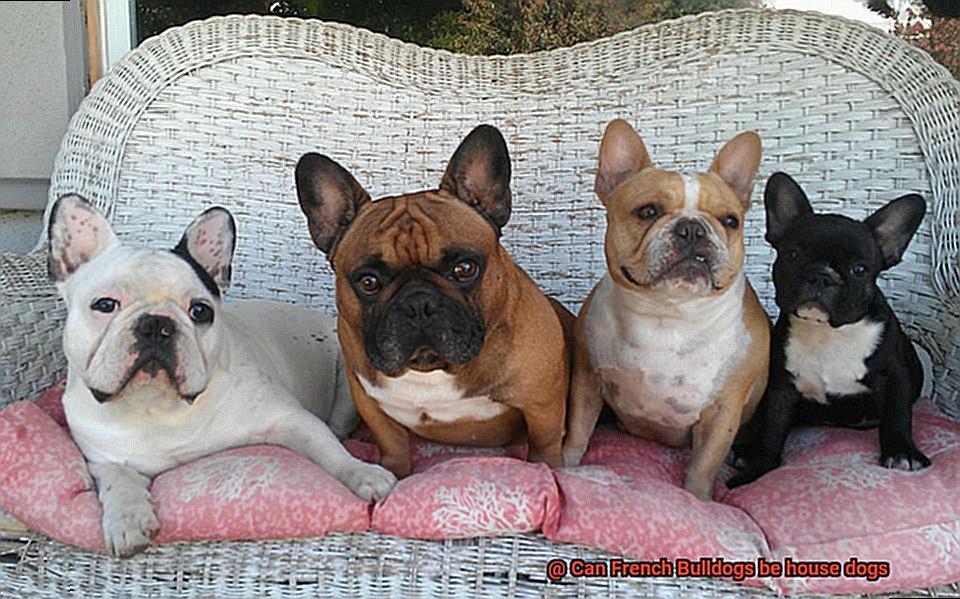
One of the most effective ways to minimize separation anxiety in French Bulldogs is through gradual desensitization. This involves exposing your Frenchie to short periods of alone time and gradually increasing the duration over time.
Start by leaving them alone for just a few minutes and gradually extend the time as they become more comfortable. Remember to reward them with treats or praise when they remain calm during these practice sessions.
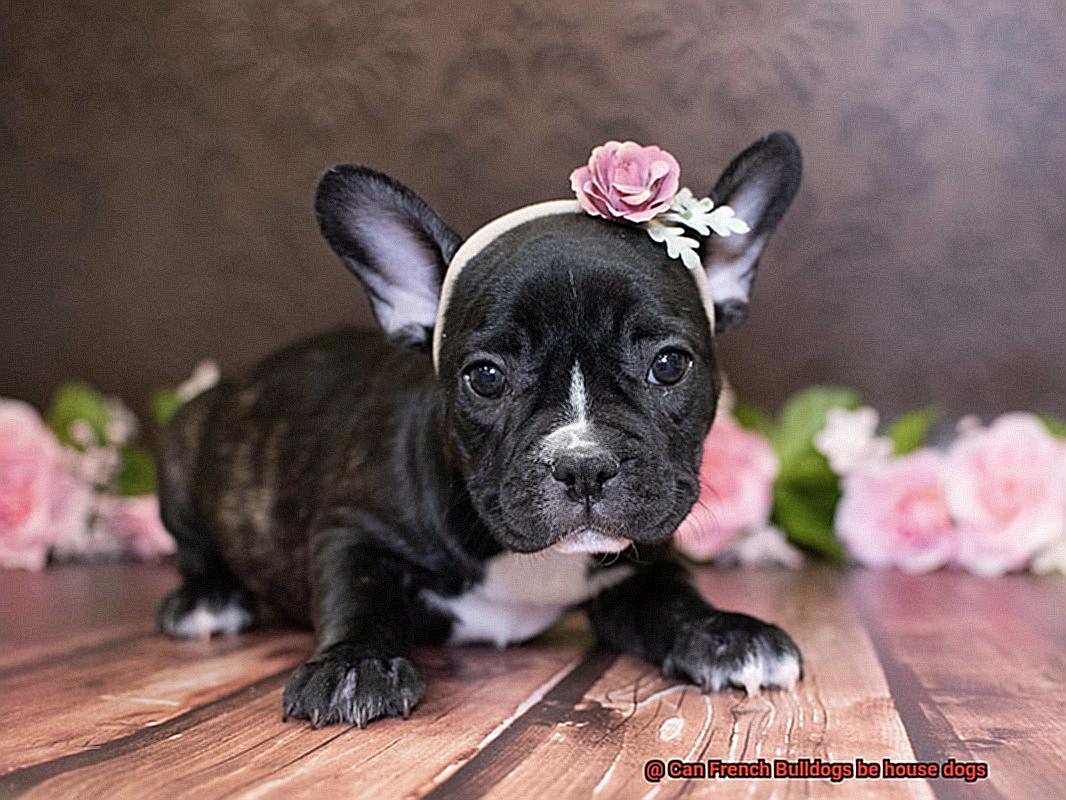
Mental Stimulation and Physical Exercise:
French Bulldogs are energetic dogs that need regular exercise to release pent-up energy. Engaging in activities such as daily walks, interactive play sessions, or puzzle toys can help keep their minds occupied and tire them out, reducing the likelihood of anxiety-related behaviors. Make sure to provide both mental stimulation and physical exercise before leaving them alone.
Creating a Safe Environment:
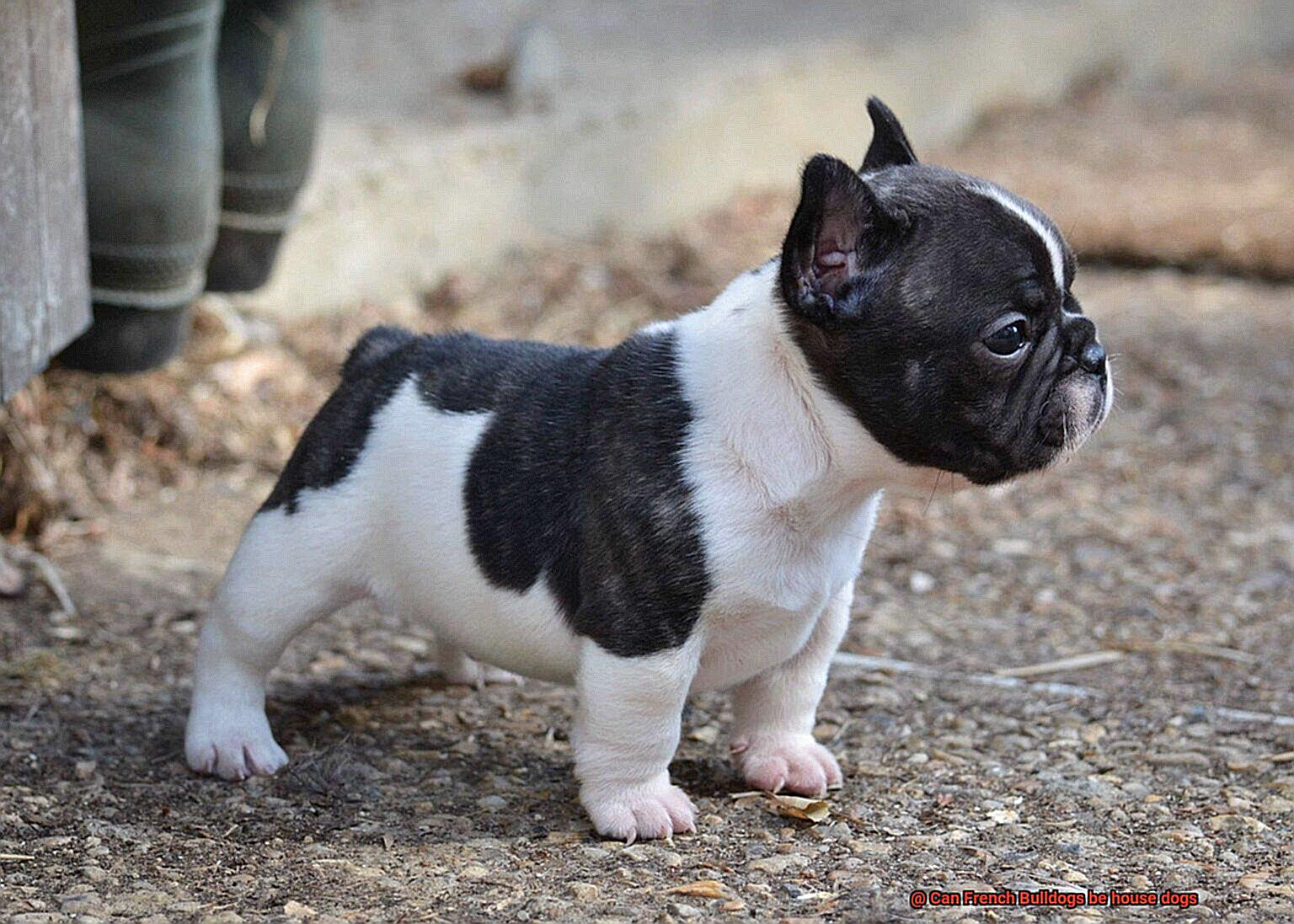
Providing a safe and comfortable environment is crucial when minimizing separation anxiety in French Bulldogs. Ensure they have access to their favorite toys, a cozy bed, and a designated area where they feel secure. Some owners find that leaving a piece of clothing with their scent can provide comfort and reassurance to the dog when they are alone.
Avoid Emotional Departures and Arrivals:
It may be tempting to shower your French Bulldog with affection before leaving or upon arrival, but this can actually reinforce their anxiety by making the departure or return a highly emotional event. Instead, try to maintain a calm and low-key demeanor during these times. This will help your Frenchie associate departures and arrivals with normal, everyday occurrences.
Seek Professional Help if Needed:
If despite your efforts, your French Bulldog continues to exhibit severe separation anxiety, it may be beneficial to seek professional help. A veterinarian or a certified animal behaviorist can provide guidance and develop a tailored plan to address your dog’s specific needs. Remember, each dog is unique, so it may take time and patience to find the most effective approach for your French Bulldog.
Grooming Needs for French Bulldogs: What Should You Know?
In fact, proper grooming is essential to keep them clean, healthy, and looking their best. As an expert on French Bulldog grooming, I’m here to share some important tips and tricks to help you keep your furry friend in top shape.
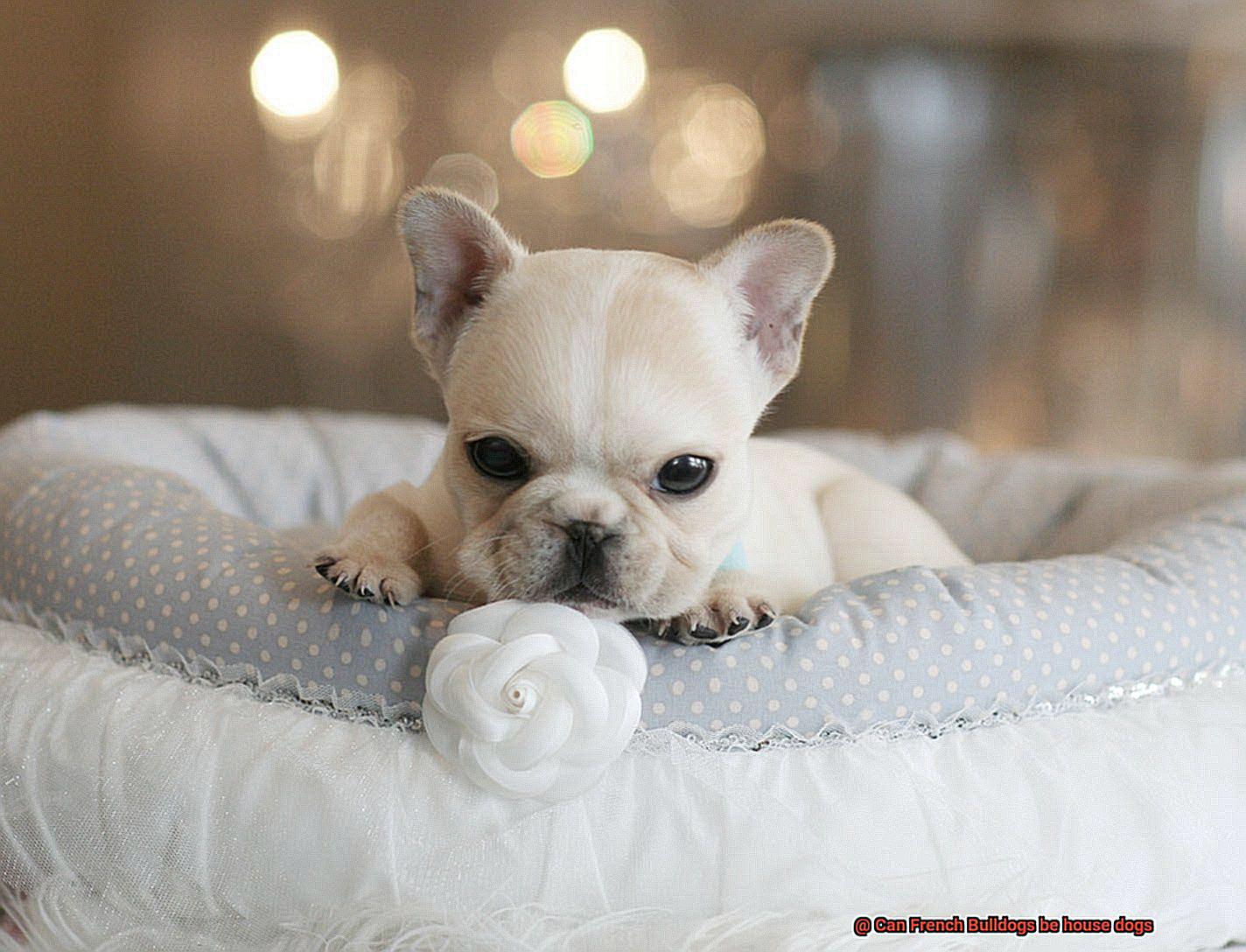
- Brushing: Despite their short coat, French Bulldogs do shed, especially during seasonal changes. Regular brushing once or twice a week will help remove loose hair and prevent matting. It’s also a great way to minimize the amount of hair they leave around your house.
- Bathing: Unlike some other breeds, French Bulldogs don’t need frequent baths. In fact, over-bathing can strip their skin of natural oils and cause dryness or irritation. Aim for bathing every 2 to 3 months or as needed. Use a mild dog shampoo specifically formulated for their sensitive skin to avoid allergies or irritations.
- Facial Wrinkles: Those adorable facial wrinkles that French Bulldogs have can easily trap moisture, dirt, and bacteria if not properly cleaned. Gently wipe between the folds with a damp cloth or baby wipe to prevent skin infections.
- Ear Cleaning: French Bulldogs have large, upright ears that can collect dirt and debris. Regularly check and clean their ears using a vet-approved ear cleaner to prevent infections.
- Nail Trimming: Trim your French Bulldog’s nails regularly to avoid discomfort and difficulty walking. Nails should be trimmed every 2 to 4 weeks, depending on their growth rate.
- Dental Care: Just like humans, French Bulldogs need dental care too. Regular teeth brushing with a dog-friendly toothpaste and routine dental check-ups can prevent dental diseases and bad breath.
Benefits of Having a French Bulldog as a House Dog
Their adaptability, size, calm demeanor, low exercise requirements, sociability, low grooming needs, companionable nature, trainability, and unique appearance all contribute to their appeal as the perfect house companion.
Adaptability and Size
French Bulldogs are known for their adaptability and can easily adjust to living in a house. They are not overly energetic dogs, making them well-suited for apartment living or smaller homes. Their small size is also a major benefit, as they do not require a large living space. This makes them an ideal choice for individuals or families living in urban areas or those with limited space.
Calm Demeanor
French Bulldogs have a calm and laid-back demeanor, which makes them excellent companions for people who prefer a more relaxed lifestyle. They are content with spending time indoors, lounging on the couch, or simply being by their owner’s side. Their presence can bring a sense of tranquility and comfort to any household.
Low Exercise Requirements
Another benefit of having a French Bulldog as a house dog is their low exercise requirements. While they still need regular exercise to stay healthy, they do not require intense physical activity like some other breeds.
A daily walk or playtime in the backyard is usually sufficient to meet their exercise needs. This makes them a great choice for individuals with a less active lifestyle or those who may have physical limitations.
Sociability and Compatibility
French Bulldogs are known for their friendly and sociable nature. They get along well with children and other pets, making them an ideal choice for families with kids or multiple pets. Their affectionate and gentle nature also makes them great therapy dogs. They bring joy and laughter to any household, creating an atmosphere of love and happiness.
Low Grooming Needs
French Bulldogs are relatively low maintenance when it comes to grooming. Their short coat requires minimal brushing and they do not shed excessively. This can be advantageous for individuals who prefer a clean and tidy living environment. Regular bathing, ear cleaning, and nail trimming are typically all that is needed to keep them looking their best.
Companionship and Emotional Support
Being a companion breed, French Bulldogs thrive on human interaction and love being part of the family. They are loyal and devoted to their owners, often forming strong bonds with them. Having a French Bulldog as a house dog can provide companionship and emotional support to individuals or families. They are always there to lend an ear or a paw, providing comfort and unwavering loyalty.
Potential Challenges of Keeping a French Bulldog as a House Dog
There are some potential challenges that owners should be aware of to ensure the well-being of their furry companions. In this section, we will discuss these challenges and provide solutions to help you navigate them successfully.
Health Issues:
French Bulldogs are brachycephalic breeds, which means they have short noses and flat faces. This can lead to breathing difficulties and overheating, making temperature regulation a challenge for house dogs, especially in hot climates or during the summer months.
To combat this issue, provide your Frenchie with a cool and comfortable indoor environment, avoid vigorous exercise in hot weather, and always have fresh water available.
Obesity:
French Bulldogs are prone to obesity if not properly exercised and fed a balanced diet. As house dogs, they may not get enough physical activity, leading to weight gain and associated health problems. To prevent obesity, establish a regular exercise routine for your Frenchie, including daily walks or play sessions. Consult with your veterinarian to determine the appropriate amount of food for your dog’s size and age.
Training Challenges:
French Bulldogs can be stubborn when it comes to training. Without proper training and socialization, they may exhibit behavioral problems such as aggression or excessive barking. To overcome this challenge, be consistent and patient with your Frenchie’s training. Use positive reinforcement techniques like treats and praise to motivate them. Consider enrolling in obedience classes or working with a professional dog trainer to enhance your Frenchie’s social skills.
Grooming Needs:
French Bulldogs have a short coat that sheds moderately but requires regular brushing to minimize shedding and keep their coat healthy. Additionally, their facial folds need regular cleaning to prevent infections. Schedule regular grooming sessions for your Frenchie to maintain their hygiene and prevent skin issues. Use a soft brush or grooming glove to remove loose hair and keep their coat shiny.
Separation Anxiety:
French Bulldogs form strong bonds with their owners and can experience separation anxiety when left alone for long periods. This may lead to destructive behaviors or excessive barking. To alleviate separation anxiety, gradually introduce your Frenchie to being alone by starting with short periods and gradually increasing the duration. Provide them with interactive toys or puzzles to keep them mentally stimulated in your absence.
Temperature Sensitivity:
French Bulldogs are sensitive to extreme temperatures, both hot and cold. They are more susceptible to heatstroke and hypothermia compared to other breeds. As house dogs, ensure they have access to a comfortable indoor environment with regulated temperatures, especially during extreme weather conditions. Use air conditioning or fans in hot weather and provide warm bedding or sweaters in cold weather.
f3XueAlb5Q4″ >
Conclusion
In conclusion, French Bulldogs are truly remarkable house dogs. With their calm demeanor and minimal exercise requirements, they are a perfect fit for apartment living or homes with limited outdoor space. While they do need some physical activity and mental stimulation, their needs are not as demanding as those of other breeds.
However, it’s crucial to be mindful of their sensitivity to extreme temperatures. French Bulldogs can easily overheat in hot weather and are susceptible to hypothermia in cold weather. To keep them safe and comfortable, it’s essential to provide shade, fresh water, and even some fashionable doggy clothing.
Regular grooming is also a must for French Bulldogs to maintain a clean and healthy short coat. Brushing, bathing, ear cleaning, and nail trimming should all be part of their regular pampering routine.
While they generally get along well with children and other pets, French Bulldogs may develop separation anxiety if left alone for extended periods. To minimize this issue, gradual desensitization techniques, mental stimulation activities, and creating a secure environment can work wonders.
All things considered, the advantages of having a French Bulldog as a house dog far outweigh any potential challenges.



